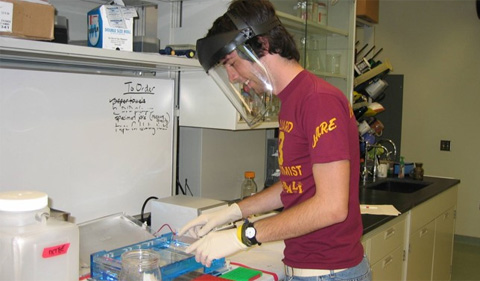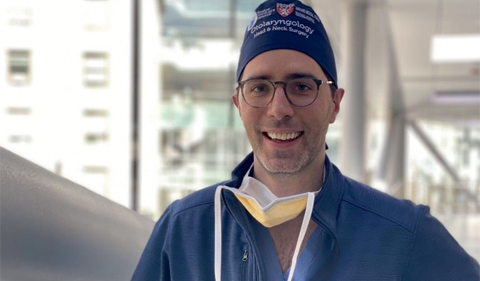Ohio University alumnus Dr. Aiden Eliot Shearer made a virtual stop at his alma mater recently, talking about his research on the genetics of pediatric hearing loss with faculty and students at a Biological Sciences/Biomedical Science Seminar.
Evaluation of children for hearing loss has changed dramatically over the past 15 years due to advances in genome sequencing technologies, and Shearer discussed his own research on the genetic diagnosis of pediatric hearing loss. Shearer, a College of Arts & Sciences Notable Alumnus, attended OHIO as an Honors Tutorial College student from 2003-07.
At OHIO, he was active in several research labs, where he discovered his fascination with genetics. One of those labs was with Dr. Molly Morris,
“Eliot (Aiden to those of us in the fish lab) was a good field and lab biologist, publishing a paper based on his sequence work and remaining a lab icon for years after he graduated!” Morris said.
Shearer completed his Honors College thesis under the tutelage of Dr. Anne Loucks, who noted, “Aiden presented the results of his senior thesis research at the 2007 Endocrine Society Meeting in Toronto, where his poster presentation was selected by the New York Times for publicity in a weekly column on health.”
After graduating from OHIO, Shearer began medical school at the University of Iowa, had a five-year residency to ecome an ears, nose, and throat doctor, and a fellowship for extra training to care for children (pediatric otolaryngology).
Now Shearer is an attending physician at Boston Children’s Hospital and and a faculty member of Harvard Medical School, where he does basic and translational research on the genetic factors behind hearing loss. Hearing loss in children is very common, with one in 500 children affected, and Shearer is studying genetics to further understand the mechanisms and genes behind hearing loss. In many ways, Shearer “works as a bridge between basic science and clinical medicine” as he is often collaborating with basic scientists who are doing research on gene therapy and stem cells to supplement his practice and research.
In the next five years, Shearer hopes to be at the forefront genetic diagnostics for hearing loss and clinical trials for gene therapy. He has also published a plethora of work supporting his research on improving genetic testing for hearing loss using new DNA sequencing methods and is working to improve ways of detecting hearing loss in newborn babies.

Dr. Shearer performing his first molecular work in Dr. Morris’ lab. Sequencing mitochondria control region, discovering haplotypes used to identify evolutionary relationships among populations of X. birchmanni.
Article by Hannah Cordes




















Comments